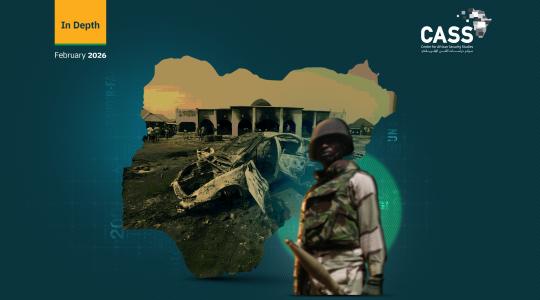From December 2023 onwards, there was a notable shift in the nature of the Islamic State group’s operations in Africa. IS attacks became markedly more advanced in terms of their scale, the types of weapons employed and the way they were executed. This trend was seen across the group’s zones of operation in the Democratic Republic of Congo, Nigeria, Burkina Faso, Mali and Mozambique. It continued into the first half of 2024, necessitating a closer look at the factors driving this shift across so much of Africa.
Jihadist Knowledge Transfer
Security sources told the Center for African Security Studies that several senior IS personnel based in Syria and Iraq had relocated via Yemen to Somalia, to Central Africa (particularly the DRC), via Libya to destinations such as Chad, Niger, or finally through Algeria to Mali. These operatives include military, security, and Islamic law specialists, as well as technicians with expertise in manufacturing explosives and rigging car bombs.
IS reportedly sent around 15 such figures to Mozambique, headed by Sharia Abu Hudhayfa Al-Muhajir (a Libyan whose real name is unknown), who has become the group’s Sharia judge and military commander in the country. Abu Hudhayfa was involved in establishing the Libyan-dominated Al-Battar Brigade in Syria before moving back to Libya in 2015, where he remained until moving to Mozambique late last year. He is believed to have formulated a general plan to develop the organization’s operations and structure in Africa, and was chosen to be the group’s top Sharia figure and military commander in Mozambique. It appears that the IS takeover of much of Cabo Delgado province in northeastern Mozambique is primarily a result of the military instructions and plans he drew up with the team he brought to the region.
Mali’s Ménaka region has meanwhile emerged as the jihadist group’s second key stronghold in Africa. The head of the group’s Sahel branch or “state” (wilaya), Abu Muhammad al-Sahrawi, has been working since mid-2023 to bring IS members with useful expertise and redeploy them in the countries of the western Sahel. He has also sent personnel into Nigeria, which has seen an uptick in suicide attacks, car bombings and the manufacture of explosive devices in general.
Information seen by the Center for African Security Studies confirm that IS has set up workshops to manufacture bombs, explosive belts and mortar shells, as well as running training courses in the Sambisa forests in northeastern Nigeria, Menaka in eastern Mali and neighboring Tillabéri in western Niger. It has also set up similar arms factories in the Macomia region of Cabo Delgado, where it enjoys almost total territorial control. Most of the IS personnel overseeing these workshops are Syrians, Iraqis, and Libyans who joined the organization in those countries between 2012 and 2016.
Drivers of IS Weapons Production
The group’s current focus is on manufacturing explosive devices for use against its adversaries in the areas mentioned above. While these factories are mainly tasked with manufacturing explosive devices and mortar shells, these are likely quite rudimentary in terms of their capabilities and the technology they employ—for now. However, the facilities pose a significant security threat, due to their ability to produce car bombs and explosive devices that have a substantial impact on operations against the region’s regular armies.
By establishing these manufacturing sites, IS aims to consolidate its presence in the region, both by developing the weaponry it produces and accumulating large stockpiles at secret locations. These arsenals could be transformed into strategic armories, to prolong the group’s ability to fight in the event that it is exposed to future security or military setbacks. In parallel, IS will likely use some of the materiel produced at these sites in order to step up its attacks on regular and security forces and the armed groups loyal to them, thus expanding the scope of its operations and potentially seizing more territory.
What is clear is that IS will not be satisfied with continuing to producing weaponry at the current rate or quality. Rather, it will strive to produce advanced weapons comparable to those it manufactured and used in Syria and Iraq. Controlling significant territories in Africa gives it the financial and logistical resources necessary for this, especially given the lack of security, ethnic conflicts and the worsening economic situation in these areas. All these factors are incentivizing more young people to join jihadist groups, both in a desperate search of income and to fulfil their personal and ideological ambitions.
IS is also likely to use the weapons manufacturing expertise gained in Syria and Iraq and develop it further in Africa. Thus, it could start to develop and deploy suicide drones, as well as other highly destructive and effective weapons systems.
This suggests that the security threat IS poses on the African continent is likely to escalate over the coming years.




